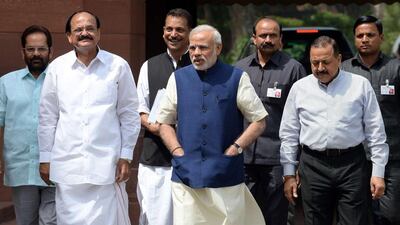NEW DELHI // Prime minister Narendra Modi’s government introduced its land acquisition bill in parliament on Monday, the first day of a new parliamentary session in India, but hostility from opposition legislators signalled the bill will have a difficult passage into law.
The bill, one of Mr Modi’s biggest undertakings during his first year as prime minister, amends a 2013 law passed by the previous Congress-led government.
The amendments will make it easier for industries and infrastructure firms to acquire land for new projects, particularly in rural India.
But the opposition has alleged that Mr Modi’s bill tramples upon the rights of the poor — farmers and small landholders in particular.
Soon after the bill was introduced in the Lok Sabha, parliament’s lower house, on Monday, the Congress and other opposition parties stalled proceedings, leading to an adjournment until the afternoon.
Later in the day, Rahul Gandhi, the vice president of the Congress party who has just returned from a two-month sabbatical, berated the government for working only for corporate interests.
“You talk about strengthening the country, but what is the result of all this?” Mr Gandhi said. “You are hurting the farmers of this country … Your corporate friends want the land of our nation.”
Mr Modi’s government has defended the bill, insisting that it is fair to everyone and necessary to revive India’s sluggish manufacturing and infrastructure growth rates.
The bill “takes care of the imperatives of growth and employment on the one hand, and interests of the farmers on the other”, Birender Singh, Mr Modi’s minister for rural development, told the IANS news agency on Sunday. “The bill is the need of the hour. If we do not seize our opportunities, the world will not wait for us.”
Mr Modi’s effort to amend the 2013 law has so far been controversial and complicated.
According to the 2013 law, if a company wanted government permission to acquire a large swathe of land for a new project, it needed to show that it had the consent of at least 80 per cent of the owners of the land. It also had to conduct a social impact assessment and was prevented from acquiring — beyond specific limits — irrigated, multi-cropped agricultural land.
Under the amendments, key projects in defence, rural infrastructure, affordable housing and industrial corridors are exempted from these rules. This would enable corporations to acquire fertile farmland more easily, and by avoiding social impact assessments, to minimise the number of people who would need to be compensated for the loss of their land.
The amendments were first put into effect by way of an executive order — an ordinance — on December 31, when parliament was not in session. But ordinances lapse within six weeks of parliament convening, so the government had needed to pass the bill during the previous session of parliament, which ran from February 23 to March 21.
The Lok Sabha, where Mr Modi’s Bharatiya Janata Party (BJP) enjoys a majority, passed the bill on March 10. But the Rajya Sabha, the upper house, where the BJP and its allies hold only 63 out of 245 seats, refused to pass the bill during that parliamentary session.
Mr Modi therefore reissued the ordinance on April 3, two days before it was due to lapse, incorporating within it nine changes by way of compromise to the opposition.
These changes included a mandate that a member from every farming family selling its land be provided employment in the new project. Projects falling under the category of social infrastructure — such as schools, hospitals and universities — were also forced to adhere to the consent and social impact assessment.
The modified bill also instructs the government to ensure that the amount of land being acquired is the absolute minimum land required for the project, so that acquired land is not then “flipped” or sold commercially at a profit, in the future.
But even these changes have been insufficient to quell the opposition’s criticisms of the bill.
On Sunday, the Congress held a rally of 80,000 people — mostly farmers — in New Delhi. Mr Gandhi promised protesters that his party would stand with them.
Mr Modi won the election last May by taking millions of rupees’ worth of loans “from big industrialists … How will he pay back those loans now?” Mr Gandhi said, addressing the crowds.
“He will do it by giving your land to those top industrialists. He wants to weaken the farmers, then snatch their land and give it to his industrialist friends.”
The current parliament session is scheduled to end on May 8. In theory, Mr Modi can issue yet another ordinance after that, keeping his version of the bill in effect.
But the supreme court has agreed to hear a petition challenging the prime minister’s right to keep a law in place by reissuing an ordinance.
Filed by a lawyer on behalf of four farmers’ welfare associations, the petition argues that the government cannot resort to ordinances because of “lack of political will or consensus or the fear ... of getting defeated on the floor of the House”.
As yet, the case is in its nascent stages, with the government in the midst of supplying the court with records pertaining to its ordinances. But an adverse decision by the supreme court would hamper Mr Modi’s ability to reissue the ordinance a third time.
ssubramanian@thenational.ae

